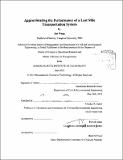| dc.contributor.advisor | Amedeo R. Odoni. | en_US |
| dc.contributor.author | Wang, Hai, Ph. D. Massachusetts Institute of Technology | en_US |
| dc.contributor.other | Massachusetts Institute of Technology. Operations Research Center. | en_US |
| dc.date.accessioned | 2013-03-28T18:08:24Z | |
| dc.date.available | 2013-03-28T18:08:24Z | |
| dc.date.copyright | 2012 | en_US |
| dc.date.issued | 2012 | en_US |
| dc.identifier.uri | http://hdl.handle.net/1721.1/78148 | |
| dc.description | Thesis (S.M. in Transportation)--Massachusetts Institute of Technology, Dept. of Civil and Environmental Engineering; and, (S.M.)--Massachusetts Institute of Technology, Sloan School of Management, Operations Research Center, 2012. | en_US |
| dc.description | Cataloged from PDF version of thesis. | en_US |
| dc.description | Includes bibliographical references (p. 113). | en_US |
| dc.description.abstract | The Last Mile Problem (LMP) refers to the provision of travel service from the nearest public transportation node to a home or office. We study the supply side of this problem in a stochastic setting, with batch demands resulting from the arrival of groups of passengers at rail stations or bus stops who request last-mile service. Closed-form bounds and approximations are derived for the performance of Last Mile Transportations Systems as a function of the fundamental design parameters of such systems. An initial set of results is obtained for the case in which a fleet of vehicles of unit-capacity provides the Last Mile service and each delivery route consists of a simple round-trip between the rail station and bus stop and the single passenger's destination. These results are then extended to the general case in which the capacity of a vehicle is an arbitrary, but typically small (under 10) number. It is shown through comparisons with simulation results, that a particular strict upper bound and an approximate upper bound, both derived under similar assumptions, perform consistently and remarkably well for the entire spectrum of input values and conditions simulated. These expressions can therefore be used for the preliminary planning and design of Last Mile Transportation Systems, especially for determining approximately resource requirements, such as the number of vehicles/servers needed to achieve some pre-specified level of service. | en_US |
| dc.description.statementofresponsibility | by Hai Wang. | en_US |
| dc.format.extent | 113 p. | en_US |
| dc.language.iso | eng | en_US |
| dc.publisher | Massachusetts Institute of Technology | en_US |
| dc.rights | M.I.T. theses are protected by
copyright. They may be viewed from this source for any purpose, but
reproduction or distribution in any format is prohibited without written
permission. See provided URL for inquiries about permission. | en_US |
| dc.rights.uri | http://dspace.mit.edu/handle/1721.1/7582 | en_US |
| dc.subject | Civil and Environmental Engineering. | en_US |
| dc.subject | Operations Research Center. | en_US |
| dc.title | Approximating the performance of a last mile transportation system | en_US |
| dc.type | Thesis | en_US |
| dc.description.degree | S.M. | en_US |
| dc.description.degree | S.M.in Transportation | en_US |
| dc.contributor.department | Massachusetts Institute of Technology. Department of Civil and Environmental Engineering | |
| dc.contributor.department | Massachusetts Institute of Technology. Operations Research Center | |
| dc.contributor.department | Sloan School of Management | |
| dc.identifier.oclc | 829296935 | en_US |
